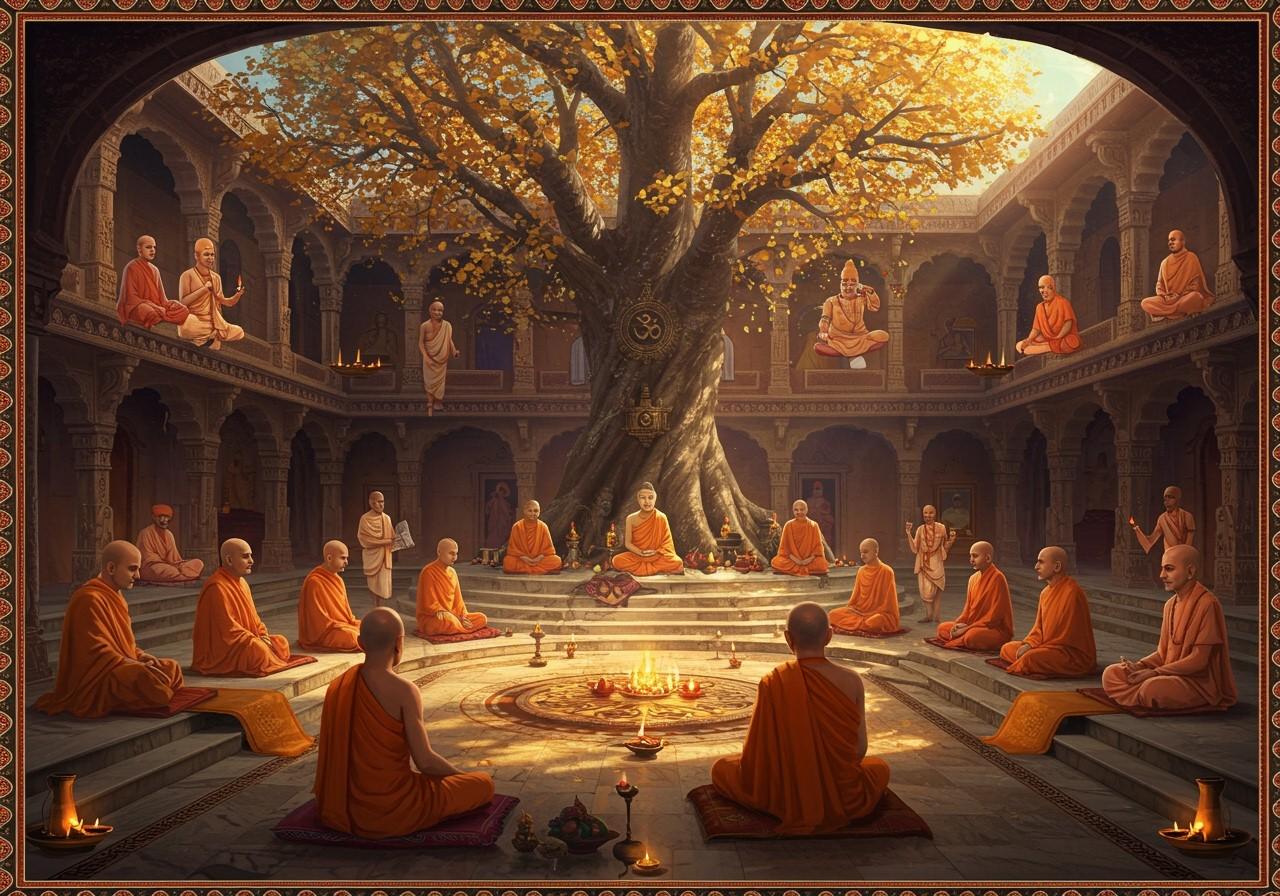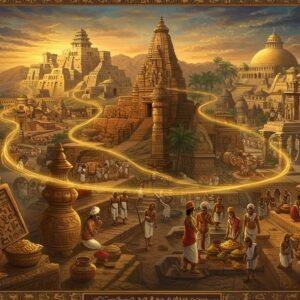
Magadha, an ancient kingdom located in what is now west-central Bihar, India, holds a significant place in India’s history. This blog delves into Magadha’s profound impact on the religious and philosophical landscape of India, exploring its interactions with key figures like the Buddha and Mahavira, its role in epic narratives such as the Mahabharata, and its contributions to the development of Buddhism and Jainism. Understanding Magadha’s influence provides valuable insights into India’s rich cultural heritage, particularly for those who cherish tradition and authenticity.
Magadha in the Mahabharata Era
Magadha’s presence in the Mahabharata underscores its early prominence. Jarasandha, the powerful king of Magadha, played a crucial role, particularly due to his conflicts with the Pandavas, especially Bhima. His complex relationships, including both alliances and enmity with Krishna, reveal the intricate political dynamics of the time. The Mahabharata’s portrayal of Magadha reflects its profound impact on ancient Indian society.
- Jarasandha’s strategic importance: Jarasandha’s control over Magadha gave him command over crucial trade routes and communication channels, influencing the political landscape of the time. His influence extended throughout the region, making him a key player in the events of the Mahabharata.
- Rich cultural heritage: The Mahabharata’s descriptions of Magadha offer glimpses into its rich cultural heritage, depicting lavish palaces, grand ceremonies, and a society steeped in tradition and ritual. These details paint a vivid picture of life in ancient Magadha.
- Depiction of society, governance, and military prowess: The epic provides insights into Magadha’s societal structure, governance, and military strategies. The narratives showcase the kingdom’s military might and the prevailing social norms of the era.
- Influence of religious practices: The Mahabharata also highlights the influence of religious practices in Magadha, showcasing rituals, ceremonies, and the importance of religious figures in the kingdom’s social fabric.
Magadha’s Diverse Religious Landscape
Magadha served as a melting pot of diverse religious traditions, including Buddhism, Jainism, and Hinduism. King Bimbisara’s relationship with the Buddha was instrumental in the early spread of Buddhism. His successor, King Ajatashatru, further strengthened Magadha’s position and actively supported Buddhist monasteries.
- Coexistence of Jainism, influenced by Mahavira: Jain teachings, profoundly influenced by Mahavira, thrived alongside other religious traditions in Magadha. This period saw the flourishing of Jain philosophy and its impact on the region’s spiritual landscape.
- Ancient Hindu temples and rituals: Magadha was home to ancient Hindu temples and rituals dedicated to various deities, demonstrating the prevalence and deep roots of Hinduism within the kingdom. The archaeological evidence points to a rich tapestry of Hindu religious practices.
- Spiritual diversity: Magadha’s unique characteristic was its spiritual diversity, with different faiths coexisting harmoniously. This environment of tolerance and intellectual exchange fostered the growth and development of multiple religious and philosophical schools of thought.
Magadha’s Philosophical Contributions
Magadha made significant contributions to Indian philosophical thought. Buddhist philosophy originated here, with key teachings preserved in texts like the Tripitaka. Jain philosophy, with its emphasis on non-violence (Ahimsa) and the multifaceted nature of truth (Anekantavada), also flourished in Magadha. These philosophical developments profoundly shaped Indian intellectual traditions.
- Vedic philosophy and rituals: The Vedic tradition, with its emphasis on rituals and sacred texts, held a prominent place in Magadha. The performance of Vedic rituals and the study of sacred texts were integral to the religious life of the kingdom.
- Role of Brahmins and sacred texts like the Vedas: Brahmins, revered as scholars and priests, played a crucial role in preserving and transmitting Vedic knowledge. The Vedas, considered sacred scriptures, were studied and interpreted, shaping the religious and philosophical discourse of the time.
- Intellectual debates in educational institutions: Magadha became a hub for intellectual debates and discussions, particularly within its renowned educational institutions like Nalanda University. Scholars from different schools of thought engaged in rigorous discussions, contributing to the evolution of Indian philosophy.
Prominent Figures and Their Contributions
Key historical figures from Magadha, including King Bimbisara and King Ajatashatru, played pivotal roles in shaping the religious and philosophical landscape of the region. Their patronage and support of various religious traditions contributed significantly to the spread of Buddhism and other faiths.
- Interactions between Mahavira and Magadha’s rulers: Mahavira’s interactions with the rulers of Magadha facilitated the dissemination of Jain teachings and the growth of Jain communities within the kingdom. These interactions highlight the interplay between religious figures and political power.
- Notable philosophers and scholars: Magadha was home to numerous philosophers and scholars who made substantial contributions to various fields of knowledge, ranging from logic and metaphysics to ethics and epistemology. Their intellectual legacy continues to inspire scholars today.
- Lasting legacy: The legacy of these figures continues to resonate in contemporary Indian culture. Their teachings and contributions have shaped religious practices, ethical values, and philosophical discourse for centuries, influencing Indian society even today.
Magadha’s Enduring Influence on Indian Culture
Magadha’s contributions have left an indelible mark on Indian culture. Architectural marvels like Nalanda University stand as testaments to the kingdom’s scholarly achievements. Religious practices from Magadha have influenced festivals, rituals, and traditions across India.
- Influence on literature, art, and music: Magadha’s spiritual and philosophical traditions inspired creative expressions in literature, art, and music. Artistic creations often depicted religious themes, reflecting the kingdom’s rich spiritual heritage.
- Enduring legacy in modern society: Magadha’s legacy endures in modern Indian society. Many traditions, festivals, and cultural practices trace their roots back to this ancient kingdom. Its influence can be seen in the continued reverence for spiritual values and the preservation of ancient rituals.
Poojn.in: Connecting You to Magadha’s Spiritual Heritage
Poojn.in, India’s leading online store for cultural goods and services, offers a wide selection of products that connect you with the rich spiritual heritage of Magadha. Whether you are seeking items for Krishna worship, Buddhist practices, or exploring other traditions, Poojn.in provides authentic and high-quality products to support your spiritual journey.
- Items for Krishna Worship: Find exquisite brass Krishna idols, flutes, peacock feathers, and complete puja thalis for Krishna abhishek.
- Products for Buddhist Practices: Explore a collection of handcrafted Buddha statues in various meditation poses, crafted from high-quality materials like brass and copper.
- Puja Essentials: Discover traditional bells, diyas, and incense holders used in temples across India, including those historically connected to Magadha.
Visit www.poojn.in today to discover a wide range of authentic puja items and deepen your connection to India’s rich spiritual traditions.
FAQs on Magadha
Which Magadha ruler was a contemporary of Buddha? King Bimbisara was a contemporary of Buddha and a key patron of his teachings.
What was Magadha’s role during the Mahabharata? Magadha was a prominent kingdom during the Mahabharata period, playing a significant role in the epic’s narrative.
Who was the king of Magadha in the Mahabharata? Jarasandha was the powerful king of Magadha during the Mahabharata era.
How did Buddhism influence Magadha? Buddhism significantly influenced Magadha by promoting principles of non-violence, ethical conduct, and spiritual development.
What was the role of Jainism in Magadha? Jainism played a crucial role in Magadha’s religious landscape, primarily through the teachings of Mahavira, who was born in the region.


